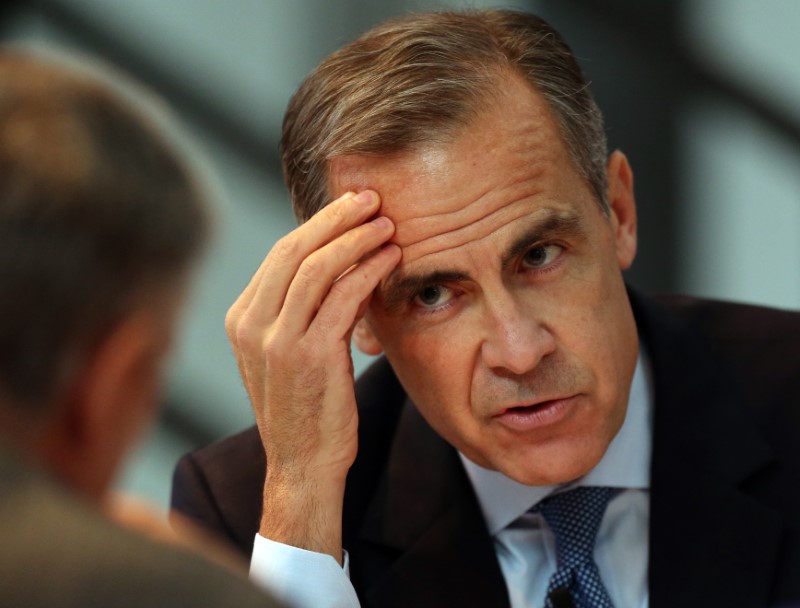By Jemima Kelly and Patrick Graham
LONDON (Reuters) - Sterling was quickly back under pressure on Tuesday after a brief boost from news Mark Carney would stay on until 2019 at the helm of the Bank of England, easing concerns for now about perceived attacks on its independence.
Criticism from some ruling Conservatives and right-leaning newspapers that Carney had taken too political a stance in the run-up to Britain's EU membership referendum had prompted speculation over the past week that the governor might leave before 2018, the scheduled end of his initial term.
That uncertainty fueled jitters over Britain's economic prospects as it heads into negotiations on post-Brexit relations with the EU, and on Monday Prime Minister Theresa May moved to back Carney, having previously been critical of his policy of ultra-low interest rates and quantitative easing.
Carney's announcement late on Monday that he would stay until the end of June 2019 - three months after Britain is scheduled to leave the EU - pushed sterling up, and it reached as high as $1.2281 on Tuesday before easing back to $1.2234, flat on the day.
It fell back half a percent to 90.10 pence against a broadly stronger euro.
"The fact that he’s staying for a bit longer than some people suggested has just provided a bit more certainty about the outlook, that the role hasn’t become as politicized as some feared," said HSBC currency strategist Dominic Bunning.
"So I can see why sterling bounced on the back of that from the very low levels we were at. But is it going to be enough to drive a much stronger currency? Not really."
SHORT EXTENSION
Under the terms of his appointment in 2013, Carney agreed to stay at the Bank for five years with the option to stay for a further three.
But around a year ago, he hinted at the possibility of taking up the extension and most economists in a Reuters poll last week said they expected Carney to agree to stay on beyond 2018.
That raised the question of whether the brief one-year extension will still leave Britain looking more exposed than it otherwise would be to financial market nerves in the second half of a two-year period of talks on leaving the bloc.
The senior London-based analysts and investors Reuters talked to on Tuesday said that might come back to haunt the pound - already down almost a fifth in value since June - but would be of secondary importance to the Brexit process.
"If by that time (June 2019) you hadn't got a ready replacement with some credibility and things are going awry on the negotiation front with the EU, then it becomes a problem for sterling," he said.
"But if things are going awry in the EU negotiations, that will be becoming an issue for sterling anyway, whether Carney is there or not."
Some investors agreed with criticism from Conservative party politicians such as the pro-Brexit Jacob Rees-Mogg, who said Carney had compromised the Bank's independence - which it was granted in 1997 - by warning of the economic risks of Brexit.
But most analysts argued that the fact that Carney was staying for a sixth year proved the opposite.
"It would have left a bad taste in the market's mouth if there had been the feeling he had been forced out," said Morgan Stanley's head of G10 currency strategy, Hans Redecker.

"We need continuity through the period of the negotiations."